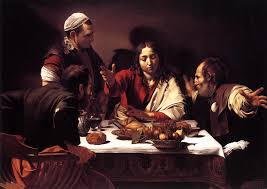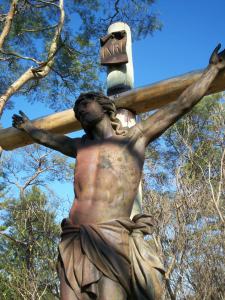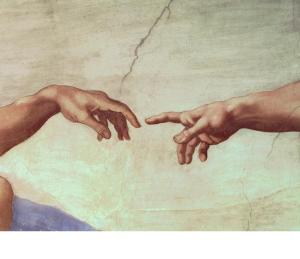One of the challenges that comes with children is teaching them appreciation for the people that play an important role in their lives, in their development and growth. Whether as a child, or as an adult, many of us can recall a time when a gift was received by a child from a special visitor – perhaps a grandparent or other relative; sometimes, if these visits were repeated over time, a pattern emerged where the child repeatedly received something from the visitor; and eventually when the visitor arrives at the door, they might be greeted with “ Hi grandma or grandpa…what did you bring me?’
It then becomes the work of the parent to lead the child to an understanding that it is the giver that is most important, rather than the gift….that love doesn’t need to be expressed with ‘presents’; eventually the hope is that the child will greet the visitor with “ Hi grandma or grandpa…I love you. It’s great to see you. You didn’t have to bring me anything, but thank you for the gift.’
One of the more common temptations for Christians as they go through life, is this idea of placing a priority on gifts we receive. Whether blessings of health, employment, family, prosperity; we can be drawn into a type of ‘ Hi God, what are you going to give me” focus in our prayer life or in our relationship with God.
We might look at some gifts as our right to have, sometimes placing demands or conditions as if God owes them to us ; sometimes we might even treat gifts as if we don’t appreciate them; imagine how we would feel if after handing someone a present, they responded with, ‘ you gave me this? This isn’t what I wanted…”
Other times, we focus so intently on the gifts that we receive, that we lose sight of who gave them to us; We fall in love with the gifts, rather than the Giver.
Our first reading today is a passage from the Old Testament Book of Job; in this passage, Job is speaking with three friends and is commenting on the shortness of our lives on earth compared to eternity; taken only in itself, and not read in the context of the entire book, this is probably one of the most depressing pieces of Scripture you could read, “…I am allotted months of emptiness and nights of misery are apportioned to me..,”
Not terribly uplifting language. But to understand it in its context, the Book of Job relates how Job was very faithful to God, and was wealthy with estates and crops and livestock and children….the Old Testament image of a successful person blessed by God. A conversation occurs between God and the devil, in which the devil insists that the only reason Job is so faithful to God is because Job has so many gifts and blessings; the devil claims Job is in love with the gifts, not the Giver.
So the devil is given permission to influence Job’s life – Job loses his riches and his family, but still will not speak out against God – no doubt we’re familiar with the line “the Lord gives and the Lord takes away”…this is where it comes from.
God tells the devil that Job is still faithful and holds him up as an example – but the devil comes back with ‘ Job is only still faithful because he still has his health, and that gift is the only reason Job still praises you…’ so the devil is given permission to further tempt, and this time Job loses his health. And during this time, while he doesn’t praise God, he doesn’t speak out against God, until his friends visit him.
These friends could be looked at as our own society. They focus on the loss of gifts, as if these are the only measure of God’s love for Job. They speak out in judgment, trying to rationalize why Job is suffering….maybe he did something wrong and God is punishing Job, or maybe Job should question God or maybe demand an explanation from God……and eventually, Job agrees and demands to know from God why he has lost all of the gifts he once had….
.
The dialogue between God and Job gives much food for thought…..it begins with God saying ‘who is this who darkens my counsel….” I will answer your question if you answer mine first…where were you when I laid the foundation of the universe? Where were you when I created all things? Was it you that I sought advice from before creating life?..and on it goes for several chapters.
The dialogue eventually ends with Job basically saying ‘You’re right God…you are God, not me, and you create and build for your own purpose, not mine. Thanks for gifts you did give me – all I ever had, I received from You in the first place.
In other words, You are the Giver, God, not me…all is gift and my focus should be on you, not on what you have or have not given to me.’ Your gifts are yours to give, not mine to take.
It is because of this sense of gratitude, then that God restores everything to Job, but God is not pleased with the three ‘friends’ who gave Job all of their advice….and you can read further in this book.
And yet, the response of the friends is a very common, human response. Instead of simply being present to Job in his suffering, they want to rationalize it, to provide a reason from a human standpoint…at no time do they comment on all of the blessings and gifts that Job had. At no point do they even try to comment that while they can’t give a reason for this ‘turn of fortune’, that Job should trust that God still loves him. It is as though the gifts were the sole measure of the relationship between Job and God. It is as though without gifts, the relationship was unimportant.
In much the same way, our passage from St. Mark’s Gospel raises this notion. Continuing from what we heard last Sunday, from Jesus’ early ministry in Capernaum and his visit to the synagogue and casting out a demon, this passage takes place on the same day, and a very full day it is. Jesus goes to the house of St. Peter where he heals St. Peter’s mother in law, and she waits on them. After hearing about the happenings in the synagogue, the local citizens bring all of the sick and suffering to the door of St. Peter’s house at sundown…it says the whole city was gathered there, and Jesus performs many miracles of healing and casting out of demons well into the night. In the early morning, while it is still dark, Jesus goes away by himself to a quiet deserted place to pray, to spend time alone with God, the Giver of all things.
It says the disciples ‘hunted’ for Him, and when they found Him said ‘Everyone is searching for you.”
The question we might ask at this point is ‘why’ was ‘everyone’ searching for Jesus? For some it may have been his teachings in the synagogue…for others it may have been a feeling of being drawn to Jesus in his generosity and kindness in his dealings with people…but for many it was likely to see another miracle performed, to witness another ‘gift’ of healing at the hands of Jesus.
And how does Jesus respond? Rather than going back into Capernaum and giving more gifts on command, He says it’s time to go to the neighboring towns…” so that I may proclaim the message there also; for that is what I came to do.” The focus of Christ’s ministry is proclaiming the Good news of salvation; that God is acting to reunite Himself to humankind. But it seems that in dealing with people at this time, that’s not the news they are interested in ; that’s not the gift they want most –the gift of relationship with God – they are more interested in the gifts of something miraculous that they can see – something extraordinary or visibly outstanding…..
Almost an expression of ‘Hi Jesus, what did you bring me?’
In our own world, many people thirst and hunger for a relationship with God…in fact, we could echo the words of the disciples, God “Everyone is searching for you.” But unfortunately, many seek to fill that hunger with things that draw them away from God – entirely focusing on material gain, power, luxuries…as if these ‘gifts’ could satisfy their deepest longings…but these ‘gifts’, these ‘things’ don’t satisfy because they are not eternal. As St. Augustine noted ‘our hearts can never rest O Lord until they rest in you.’
We have gifts at every Mass; we have a miracle at each and every Eucharistic celebration, when through the power of God, bread and wine are transformed into the Body and Blood of Jesus, Our Savior. We receive and hear the living Word of God proclaimed in the readings. We gather to worship, and in that gathering of two or more Christ Himself is in our midst. The Church has all of these gifts, they are a constant. But they are not ours to demand or take – that are God’s gifts, freely given out of love for each of us.
They are an expression of God’s invitation to enter into a deeper relationship with Him.
They are an invitation to us to live in gratitude for the knowledge that God knows each of us, and loves us and wants us to live in Him.
They are a reminder of self-giving, and that more important than any blessings and gifts that we have received in our lives, the most important is God’s gift of Himself in the person of Jesus to us;
that the Giver is the ultimate gift.
Praised be Jesus Christ, now and forever!





